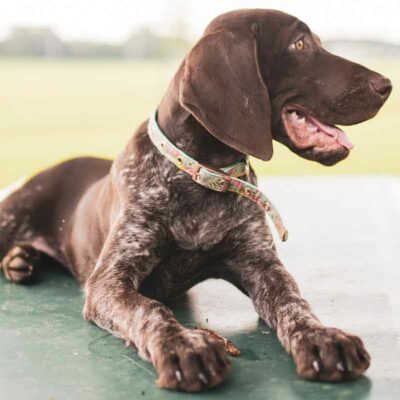
The German Shorthaired Pointer dog breed
The German Shorthaired Pointer, often abbreviated as GSP, is a medium to large sporting breed originating from Germany.
It is recognized by its lean physique, floppy ears, and distinctive liver brown markings on its short coat. With its athleticism, intelligence, and friendly demeanor, the GSP has garnered considerable popularity.
This versatile dog breed consistently ranks among the American Kennel Club’s top 10 most beloved dog breeds. The German Shorthaired Pointer is equally at home as a family companion and a hunter’s steadfast partner.
A robust yet agile breed, the GSP excels in the field while maintaining its friendly and alert nature, making it an excellent choice for active individuals and families.
Keep in mind that the GSP boasts abundant energy, but if you can keep pace with this lively canine, you’ll have an intelligent and vivacious companion for life.
Characteristics of the German Shorthaired Pointer
German Shorthaired Pointers are quick learners with an inherent desire to be occupied. Bred for spending hours with hunters, tracking, pointing, and retrieving game, they possess an unwavering work ethic that requires constructive channeling.
At home, GSPs exhibit highly affectionate personalities, rendering them popular among families with older children due to their loyalty and playfulness. However, younger children might find the dog’s boundless energy overwhelming.
Regardless of your interests, involving your GSP in your outdoor activities is essential. It’s best to adopt this breed if you lead an active lifestyle and can regularly include your dog. They thrive when in the company of their family and necessitate ample exercise.
When they receive both attention and exercise, they are known for their happiness and sociable nature. Without sufficient exercise, their enthusiasm can turn into destructive energy.
History of the German Shorthaired Pointer
The breed’s name aptly signifies its country of origin, Germany, during the 1800s. Sporting enthusiasts aimed to create a versatile gundog proficient at both hunting game and retrieving birds. Equally important was the development of a friendly and trainable personality to make the GSP an adept partner and an easygoing companion.
The creation of this versatile breed involved breeding several German and European hunting dogs to optimize the GSP’s tracking, pointing, and retrieving abilities. These early “shorthair” hunting dogs were developed by crossbreeding the now-extinct German Bird Dog, the bloodhound, and possibly English and Spanish pointing dogs. By 1870, a studbook was established for the breed.
Beyond Bavaria, this breed became recognized as the German Shorthaired Pointer. Across Europe and the United States, hunters quickly appreciated the GSP’s exceptional capabilities in small game hunting and as an ideal dog for waterfowl hunting. They are known for their love of swimming, facilitated by their webbed feet and agile, athletic physique.
German Shorthaired Pointers made their way to the United States in the late 1920s, with formal recognition by the American Kennel Club (AKC) achieved in the spring of 1930. This breed’s popularity has persisted into modern times, consistently ranking among the AKC’s top 10 most popular dog breeds. GSPs are a preferred choice for sportsmen, as well as for individuals seeking active companions.
The German Shorthaired Club of America actively promotes the development of GSPs excelling both in the field and in show competitions. Achieving a “dual champion” status signifies the breed’s success at the highest levels in both arenas.
German Shorthaired Pointer Care
Due to their short coat, German Shorthaired Pointers require minimal grooming, focusing primarily on the basics. In terms of exercise, this breed can be demanding for families who do not regularly engage in outdoor activities.
Nevertheless, GSPs are quick learners, readily adapting to new activities and making for great companions.
Exercise
Plan to provide your German Shorthaired Pointer with at least two substantial exercise sessions each day. A brief walk around the block won’t suffice; these dogs thrive when mentally and physically challenged for extended periods.
If you are a sports enthusiast, your GSP will match your energy and determination, making them ideal jogging, hiking, or adventure companions. They excel in a wide range of canine sports, including agility, flyball, dock diving, rally, and field trials.
Your GSP will effortlessly adapt their natural talents and athleticism to any chosen activity.
Grooming
The GSP’s coat is relatively thick, coarse, and short in length. Grooming is straightforward, typically requiring a quick wipe with a grooming mitt and an occasional bath, especially if your dog encounters unpleasant odors.
Expect consistent shedding, with small hairs tending to accumulate on furniture, floors, and clothing.
Training
German Shorthaired Pointers possess a strong inclination to please their owners, stemming from their people-oriented breeding. Foster and nurture this tendency through early and ongoing obedience training. By doing so, you’ll develop an attentive and well-behaved dog, while your GSP will gain a clear understanding of your expectations.
The GSP’s affinity for hunting is ingrained in its personality. Many puppies instinctively exhibit pointing behavior with an intense gaze, lowered stance, and a “pointed” foreleg. For hunting purposes, training is straightforward and highly effective.
These dogs generally get along well with others but may be inclined to chase cats or other small pets due to their high prey drive. While they are typically obedient when it comes to recalls, their prey drive can occasionally overshadow their judgment, leading to impromptu chases. Caution is advised when exercising this breed off leash.
Common Health Problems
Thanks to their genetically diverse background, German Shorthaired Pointers are generally robust. Health issues are rare; however, their active nature can render them susceptible to injuries.
A few genetic conditions may affect them, including hip and elbow dysplasia, epilepsy, cancer (including hemangiosarcoma), Addison’s disease, and progressive retinal atrophy. Additionally, some pointers may contract Lyme disease due to their outdoor activities.
It’s essential to implement a reliable flea and tick prevention regimen to reduce the risk of tick-borne diseases.
Diet and Nutrition
German Shorthaired Pointers possess a robust appetite, and maintaining a high-protein, quality dog food is vital to meet their nutritional needs. Consult your veterinarian to establish a feeding plan tailored to your dog’s age, weight, and activity level.
To ensure long-term health and athleticism, avoid overfeeding and provide treats in moderation. Since pointers are prone to Bloat, discourage rapid meal consumption and minimize strenuous activities immediately after eating.


